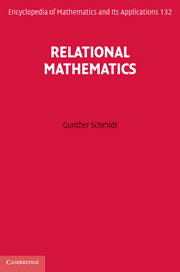Book contents
- Frontmatter
- Contents
- Notes on illustrations
- Preface
- 1 Introduction
- PART I REPRESENTATIONS OF RELATIONS
- PART II OPERATIONS AND CONSTRUCTIONS
- PART III ALGEBRA
- PART IV APPLICATIONS
- PART V ADVANCED TOPICS
- Appendix A Notation
- Appendix B Proofs postponed from Part II
- Appendix C Algebraic visualization
- Appendix D Historical annotations
- References
- Symbols
- Index
Preface
Published online by Cambridge University Press: 05 May 2013
- Frontmatter
- Contents
- Notes on illustrations
- Preface
- 1 Introduction
- PART I REPRESENTATIONS OF RELATIONS
- PART II OPERATIONS AND CONSTRUCTIONS
- PART III ALGEBRA
- PART IV APPLICATIONS
- PART V ADVANCED TOPICS
- Appendix A Notation
- Appendix B Proofs postponed from Part II
- Appendix C Algebraic visualization
- Appendix D Historical annotations
- References
- Symbols
- Index
Summary
This book addresses the broad community of researchers in various fields who use relations in their scientific work. Relations occur or are used in such diverse areas as psychology, pedagogy, social choice theory, linguistics, preference modelling, ranking, multicriteria decision studies, machine learning, voting theories, spatial reasoning, data base optimization, and many more. In all these fields, and of course in mathematics and computer science, relations are used to express, to model, to reason, and to compute with. Today, problems arising in applications are increasingly handled using relational means.
In some of the above mentioned areas it sometimes looks as if the wheel is being reinvented when standard results are rediscovered in a new specialized context. Some areas are highly mathematical, others require only a moderate use of mathematics. Not all researchers are aware of the developments that relational methods have enjoyed in recent years.
A coherent text on this topic has so far not been available, and it is intended to provide one with this book. Being an overview of the field it offers an easy start, that is nevertheless theoretically sound and up to date. It will be a help to scientists even if they are not overly versed in mathematics but have to apply it. The exposition does not stress the mathematical side too early. Instead, visualizations of ideas – mainly via matrices but also via graphs – are presented first, while proofs during the early introductory chapters are postponed to an appendix.
- Type
- Chapter
- Information
- Relational Mathematics , pp. xi - xivPublisher: Cambridge University PressPrint publication year: 2010

